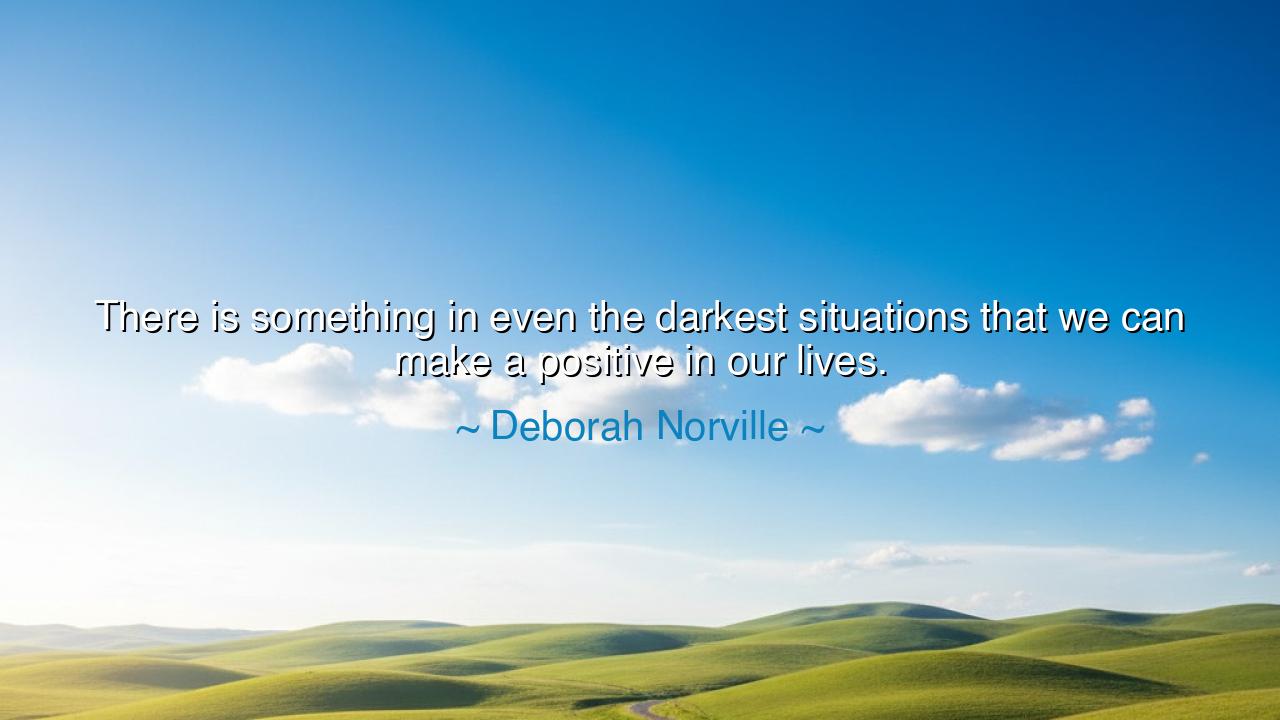
There is something in even the darkest situations that we can
There is something in even the darkest situations that we can make a positive in our lives.






The words of Deborah Norville—“There is something in even the darkest situations that we can make a positive in our lives.”—speak with the force of a torch lit in the cavern of despair. They remind us of a truth as ancient as human struggle: that though suffering may surround us like night, within its shadows lies the seed of transformation. Darkness does not only conceal grief; it also conceals the raw material from which courage, resilience, and wisdom can be forged. To see this truth is not easy, but it is the path of those who overcome and rise again.
The ancients often spoke of the alchemy of suffering. The Stoics declared that misfortune is not the enemy, but the trainer of the soul. Epictetus, once a slave, proclaimed that adversity reveals a man’s true character, like fire tests gold. So too Norville proclaims that in the darkest situations there is something—however hidden—that may be turned to strength. The darkness is real, yet it is not final. It is clay, waiting for the artist’s hands; it is iron, waiting for the fire to make it steel.
History gives us luminous examples of this truth. Consider Nelson Mandela, imprisoned for twenty-seven years under the crushing weight of apartheid. To most, such confinement would seem a total destruction of life. Yet Mandela chose to turn his darkest situation into a crucible for patience, forgiveness, and vision. He emerged not broken, but strengthened, ready to lead his nation toward reconciliation. What could have been bitterness became healing; what could have been ruin became triumph. Mandela’s life embodies Norville’s words: even in darkness, one can create light.
This truth does not erase pain, nor does it trivialize it. To suffer loss, betrayal, or hardship is to walk through real valleys of grief. Yet Norville’s wisdom lies in the conviction that no valley is utterly barren. Within every trial lies a lesson, within every heartbreak lies a capacity for empathy, within every defeat lies a spark of resilience. The task is to find it, to claim it, and to weave it into the fabric of our lives, so that suffering is not wasted, but redeemed.
To make a positive in life is not passive; it is an act of will. It requires choosing gratitude when bitterness beckons, choosing growth when despair whispers of surrender. It is the art of asking, even in the midst of tears, “What can I learn? How can this shape me? What light can I bring out of this night?” In this choice lies the power to transform tragedy into wisdom, hardship into hope, pain into purpose.
The lesson for us is profound: when darkness comes—as it surely will—do not believe it to be the end. Seek within it the hidden gift, however small. It may be a lesson in patience, a deeper empathy for others, or a renewed clarity about what truly matters. Take that gift, however fragile, and let it become your strength. For those who emerge from the night carrying light become guides for others who still wander in shadow.
So, dear listener, take Deborah Norville’s words as a sacred charge. When you face the darkest moments of your journey, do not surrender to despair. Look within, and find the seed of the positive. Nurture it with hope, protect it with perseverance, and let it grow into wisdom that endures. For this is the way of the strong, the wise, and the heroic: not to avoid the darkness, but to walk through it, and to bring out from it a light that will shine for generations.






VDvan dinh
I find this perspective both comforting and challenging. It encourages agency and resilience, but how do we teach or internalize the skill of finding positives in dark circumstances? Are there differences across personality types in the ability to reframe situations positively? I’m curious whether cultivating this approach early in life could enhance emotional intelligence and adaptability, preparing individuals to navigate both personal and professional challenges more effectively.
LNLan Ng
This quote sparks curiosity about the nature of hope. How do individuals maintain a sense of positivity when faced with ongoing adversity or systemic challenges? Could mentoring, therapy, or reflective practices help people consistently identify opportunities for good in difficult situations? I also wonder how this mindset interacts with motivation—does seeing potential positives inspire action, or can it sometimes lead to passive acceptance of hardship?
TTNguyen The Thanh
I’m intrigued by the balance this quote suggests between optimism and realism. How can people recognize positives without minimizing the severity of their challenges? Does this philosophy encourage proactive problem-solving as well as emotional coping? I also question whether cultural or personal factors influence one’s ability to find silver linings, and how social support might amplify or hinder this process.
TH10CP-SN-05- Nguyen Doan Trung Hieu
This statement makes me think about the psychological principle of reframing. How much of finding positivity in dark situations relies on perspective rather than external circumstances? Could training oneself to look for lessons, growth opportunities, or acts of kindness enhance resilience? I also wonder if there’s a limit to this approach—are there situations where focusing on the positive might obscure necessary action or prevent acknowledgment of genuine suffering?
TT53.Nguyen Tuan Tu
Reading this, I feel reflective about the human capacity to find meaning in adversity. Is there a difference between making a positive impact for oneself versus for others during hard times? I’m curious whether there are strategies, like gratitude journaling or mindful reflection, that can help individuals consistently identify positives in dark situations. It also raises the question of whether recognizing positives can coexist with processing difficult emotions honestly.